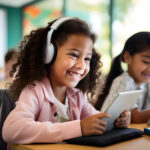Personalized learning is more critical than ever–it can help students recover lost learning and boost social-emotional growth. What’s more, it helps educators in dire need of learning solutions.
New edtech developments have helped these learning techniques become more efficient, scalable, and achievable for educators over the last decade. But many strategies were forced to take a back seat to more pressing challenges during the pandemic, and now it’s time to turn our attention to a more individual form of learning once again.
Join eSchool News and a panel of experts to explore what personalized learning looks like now and what’s to come. You’ll hear these experts share best practices, and you’ll learn why assessment and accountability are more important than ever in today’s K-12 landscape.
- 4 ways to support work-based learning - April 23, 2024
- Prioritizing inclusivity in game-based learning - April 22, 2024
- Friday 5: Universal Design for Learning - April 19, 2024
More from eSchool News
The evolving requirements of a K-12 school network
As the school year began this year, the White House announced several initiatives to curb cyberattacks on K-12 schools. This was in response to a 2022-2023 school year that saw eight major cyberattacks.
A bungled FAFSA rollout threatens students’ college ambitions
Christian Rojas Linares can’t finish his financial aid forms because he’s been blanketed with error messages. The New York City high school senior has even received incorrect emails telling him his application was canceled.
4 ways to support work-based learning
As work-based learning models grow in popularity, a new report from the Center for American Progress (CAP) highlights key themes in recently-passed state legislation that will support efforts to expand or improve such models.
Prioritizing inclusivity in game-based learning
Applying the principles and practices of inclusive design in game-based learning can expand access to rich learning experiences to a neurodiverse group of learners, according to a new whitepaper from Kahoot!.
Using universal screening to improve student well-being
The pandemic shined a light on the mental health crisis facing our students–but student well-being is not a new phenomenon.
Friday 5: Universal Design for Learning
In a nutshell, Universal Design for Learning, or UDL, is a framework that urges educators, policymakers, and all education stakeholders to think about teaching and learning in a way that gives all students–regardless of ability or need–equal opportunities to reach their full potential.
3 ways to avoid summer learning loss
While it can be easy for teachers and students to slip out of routine over the summer break, it’s important that students don’t get out of the habit of learning, lest they suffer learning loss.
Educators love their edtech, but want more training
An overwhelming majority of educators believe edtech makes teaching and learning better, according to a new survey from classroom management solution NetSupport.
High school students say AI will change the workforce
With the rapid rise of generative AI, nearly one in two high school students polled think the workforce as we know it today will undergo a major transformation, a new global survey shows.
Motivating students using the Self-Determination Theory
In the ever-evolving landscape of education, one prevailing challenge persists: motivating students. The last few years have witnessed a noticeable shift in student behavior, consisting of apathy, absenteeism, and a lack of engagement.










